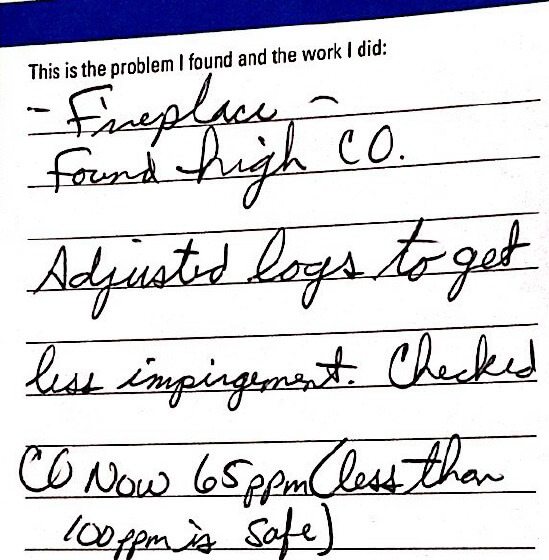I don’t get involved in real estate negotiations a whole lot; it’s not my job, it’s none of my business, and I’m not qualified to do so. As a home inspector, my job is to inspect the home, report on its condition, and make recommendations. Nevertheless, I try to provide the best service that I can to my clients, and part of that involves standing behind my recommendations and findings. I frequently tell my clients that if some other party comes in behind me and disputes my findings, or says that I’m wrong about something I reported on, to please let me know about it.
If I’m wrong, I want to know about it. It’s a learning opportunity. I have no problem making a mistake, but I DO have a problem with making the same mistake again. When I make a mistake or I hear about other inspectors in my company making a mistake, I educate everyone else in my company to make sure it doesn’t happen again. I send out an internal company newsletter every month, and it’s pretty rare for me to not have any recent mistakes to talk about. I’ve made a LOT of them, and my goal is to have the other inspectors in my company not make the same ones.
If I’m right, I want the opportunity to defend myself. I’ve gotta admit, part of that is just plain old pride. I take a lot of pride in my work, and I hate the idea of any of my clients thinking to themselves that I didn’t know what I was talking about.
The less selfish reason that I want my clients to tell me about any disputes is because I really am confident in my work, and I want to take care of my customers. When someone disputes my findings, they’re usually wrong. I’m a home inspector with no bias. I have no financial incentive to inflate a problem or minimize a problem. Home sellers, on the other hand, clearly have a financial interest to minimize or dispute issues that I find with their home. This doesn’t mean they will, but you can’t say they’re not biased.
So today, I have a quick little story to share, along with some advice on who to trust. I recently inspected a 15-year-old home in Maple Grove, and I came up with a typical laundry list of stuff that was either not installed properly or not functioning properly. Typical stuff.
After my inspection, the home buyers went back to the sellers with a small list of items that they wanted the seller to repair. It certainly wasn’t a nitpicky list either; I had about 40 “action item” recommendations in my inspection report, and the buyers asked the sellers to address 7 of them. The sellers agreed to the more basic, obvious defects that absolutely couldn’t be disputed, such as the bath fan venting into the attic and the leaking water heater, but they sure made it sound like I didn’t know what I was talking about when it came to a few of the other items. To keep this short, I’m only covering two of them.
– The HRV wasn’t working. I tested the HRV for operation, and it never turned on. I told the buyers that the HRV needed repair or replacement. The buyers asked the seller to repair or replace the HRV. Here was the listing agent’s response: Air Exchange system was not on at time of inspection. The wall switch was turned off. It is on now and operating fine.
 Gee, thanks for making me look like an incompetent dumbass who can’t find the wall switch. Thankfully, I had a conversation with the home buyer about this, and I told the buyer that he should find out exactly where that wall switch was, because I sure as heck couldn’t find any switches that were turned off.
Gee, thanks for making me look like an incompetent dumbass who can’t find the wall switch. Thankfully, I had a conversation with the home buyer about this, and I told the buyer that he should find out exactly where that wall switch was, because I sure as heck couldn’t find any switches that were turned off.
The buyer pushed this issue, and was told that the motor on the HRV was defective, and would be replaced for approximately $600. How about that? It sure sounds like someone was lying, doesn’t it? I’m pretty sure I had steam coming out of my ears when I heard that.
– The gas fireplace had a high level of carbon monoxide in the flue gas. I don’t usually test carbon monoxide on gas fireplaces, but I do when I see something that looks like a problem, and this one looked like it had a problem. I told the buyers to have the gas fireplace serviced to get it burning correctly, as there was a high level of CO in the flue gas. My guess was that the logs weren’t arranged properly. Here was the listing agent’s response: “Seller had CenterPoint at home this AM, no CO2 was found, but they will still get it serviced for your buyer.”
I told the buyer that this was a very concerning response. Here are a few points of concern that I had:
- The issue was with CO, not CO2.
- If CO (or CO2?) couldn’t be found in the flue gas, the technician was either incompetent or their equipment was broken, and I don’t believe it was either one of those things. I won’t even say what I suspect happened, because it’s not nice.
- If there truly was no issue with the fireplace, WHY WOULD THE SELLER STILL GET IT SERVICED? Yes, I’m shouting.
So what happened when the seller had the gas fireplace serviced… a second time? The tech found the same thing I found, and fixed it. The buyer was nice enough to send me the note from the service tech, shown below.
If you find yourself buying a home and someone disputes your home inspector’s findings, give your home inspector a chance to back up what they told you.
Related Posts:
- I’m not saying they cheated, but this doesn’t look good.
- “You just cost me a lot of money!”
- I didn’t kill the deal, the house did.
- “Does the seller need to fix this?”

